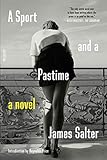 A Sport and A Pastime, James Salter’s 1967 novel about young Americans in France (not Paris, note, or not primarily) received enthusiastic reviews when it was published, but fell into relative obscurity since—a fate that seems wildly unjustified to this reader. Sure, the novel has a quiet and slow start, but as it unfolds it takes you places you never expected to go, and will never forget having visited. The conceit is simple enough: the 34-year-old protagonist camps out in his friends’ house in Autun, receives what is supposed to be a brief visit from another (younger) American, Phillip Dean, and falls prey to a series of intricately detailed and hallucinatory fantasies (or, to catch the novel’s tone more exactly, direct observations) of Dean’s relationship with Anne-Marie, a 19-year-old French girl.
A Sport and A Pastime, James Salter’s 1967 novel about young Americans in France (not Paris, note, or not primarily) received enthusiastic reviews when it was published, but fell into relative obscurity since—a fate that seems wildly unjustified to this reader. Sure, the novel has a quiet and slow start, but as it unfolds it takes you places you never expected to go, and will never forget having visited. The conceit is simple enough: the 34-year-old protagonist camps out in his friends’ house in Autun, receives what is supposed to be a brief visit from another (younger) American, Phillip Dean, and falls prey to a series of intricately detailed and hallucinatory fantasies (or, to catch the novel’s tone more exactly, direct observations) of Dean’s relationship with Anne-Marie, a 19-year-old French girl.
“The novel has a plot,” insists my husband, a long-time Salter devotee, “but the plot’s not the point. The point is the language.” The language is crystalline, patient, sensual, terse at times, and at other times languorous. It educates us first in the smallest details of its narrator’s world: “This blue, indolent town. Its cats. Its pale sky. The empty sky of morning, drained and pure. Its deep, cloven streets. Its narrow courts, the faint, rotten odor within, orange peels lying in the corners. The uneven curbstones, their edges worn away…The women come up the steep grade out of breath, their lungs creaking. In the mornings they flow softly past. In the streets there’s the smell of bread.” Then, over the course of the first eight chapters, the language moves from its delineation of the town, the narrator’s friends, and Dean himself, toward an obsessive elaboration of Dean’s relationship with Anne-Marie.
Perhaps the point, really, is the dream-state the language creates—the uncommon point of view found in no other novel I know. Disembodied, it enters the meager upstairs room—“a room on the top floor, probably, under the roof like a sparrow…a squad of inspectors could never find it”— where Anne-Marie lives, and from there we follow her and Dean into a series of minutely described sexual experiences that stir the reader without ever feeling pornographic or (worse?) clinical. We do not pause to wonder how the narrator can know the inward sensations of Dean, of Anne-Marie; we accept his description of the curve of her spine, the play of light on her skin, the smell of her breath in the morning, as knowledge rightfully his, and, by extension, ours.
In a way, the narrator’s passion for imagining somehow supplies what’s missing in the relationship between Dean, a brilliant Yale dropout whose greatest distinction is his daring refusal to follow the ordinary course, and Anne-Marie, a delightful but ordinary girl, the embodiment of the “true France.” The narrator pines not for Anne-Marie but, in a sideways fashion, for a beautiful divorcee he can’t have; his imagining of his friend’s relationship feels charged not with jealousy but with wistfulness. And maybe it’s not the divorcee he really longs for, anyway—maybe it’s the opportunity, gone now, to embody life as fully as Dean and Anne-Marie do in bed, and in the wet streets of France. It’s a novel overshadowed by death, which is to say that it reminds us that all is passing, even as the events it describes feel timeless, caught in amber. Of course, a novel as brilliant as this one works that kind of spell. Fiction’s best magic, lusciously embodied.
More from a Year in Reading 2010
Don’t miss: A Year in Reading 2009, 2008, 2007, 2006, 2005
The good stuff: The Millions’ Notable articles
The motherlode: The Millions’ Books and Reviews
Like what you see? Learn about 5 insanely easy ways to Support The Millions









